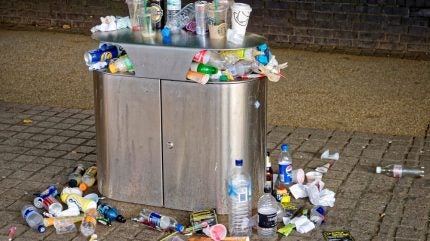
The UK Government has confirmed that a deposit return scheme (DRS) for drinks containers will go live in England and Northern Ireland in October 2027, offering consumers a financial incentive to return single-use plastic and metal bottles and cans for recycling.
The initiative aims to reduce litter, boost recycling rates and support a shift towards a circular economy.

Discover B2B Marketing That Performs
Combine business intelligence and editorial excellence to reach engaged professionals across 36 leading media platforms.
Financial incentives to tackle litter and increase recycling rates
Consumers will pay a small deposit when purchasing drinks in containers ranging from 150ml up to three litres, with the money refunded upon returning the empty bottle or can to designated collection points, including supermarkets.
By encouraging the return of containers, the government expects to cut the estimated 6.5 billion bottles and cans wasted annually across the UK, many of which currently end up littering streets, parks and beaches.
According to the Marine Conservation Society, drinks-related items polluted 97% of surveyed UK beaches in 2023.
Countries such as Germany and Sweden have achieved return rates of up to 98% with similar schemes, demonstrating the effectiveness of deposit return systems in recovering valuable materials and reducing environmental damage.

US Tariffs are shifting - will you react or anticipate?
Don’t let policy changes catch you off guard. Stay proactive with real-time data and expert analysis.
By GlobalDataScheme administration and industry involvement
New legislation has enabled the appointment of a Deposit Management Organisation (DMO) in April 2025.
This industry-led, not-for-profit body will oversee the day-to-day running of the scheme, including managing the network of return points and ensuring the smooth operation of container collection and recycling processes.
The UK Government will work closely with businesses to establish the necessary infrastructure and secure investments to support the DRS. The legislation for England and Northern Ireland complements progress in Scotland, where regulations for a similar scheme are already underway.
Northern Ireland’s Environment Minister Andrew Muir highlighted the DRS as central to green growth and climate goals, while England’s Circular Economy Minister Mary Creagh emphasised the need to curb rubbish and protect wildlife.
Environmental and economic impact of the deposit return scheme
The introduction of the DRS is expected to contribute significantly to the UK’s wider collection and packaging reforms.
Government estimates suggest these combined initiatives will support up to 21,000 new jobs and attract more than £10 billion in recycling investment over the next decade.
Environmental organisations have welcomed the move. Keep Britain Tidy’s chief executive called the scheme a “silver bullet” for tackling litter, and the Marine Conservation Society described the decision as a “fantastic win for our seas.”
Meanwhile, industry representatives, including Coca-Cola Europacific Partners and the Association of Convenience Stores, have expressed support and are preparing to meet the October 2027 launch timeline.
Beyond the DRS, the government is introducing further measures to end the throwaway culture, including a ban on single-use vapes starting June 2025 and stricter conditions on new waste incinerators announced in late 2024.
These steps form part of the government’s broader plan to reduce waste, increase recycling rates, and build a more sustainable, circular economy in the UK.





